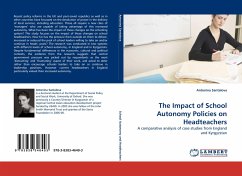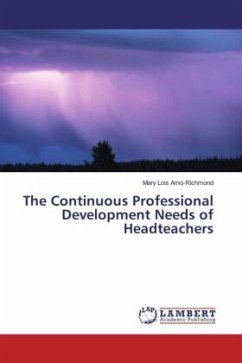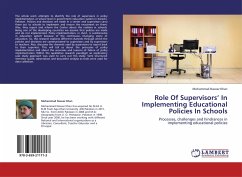
The Impact of School Autonomy Policies on Headteachers
A comparative analysis of case studies from England and Kyrgyzstan
Versandkostenfrei!
Versandfertig in 6-10 Tagen
32,99 €
inkl. MwSt.

PAYBACK Punkte
16 °P sammeln!
Recent policy reforms in the UK and post-soviet republics as well as in other countries have focussed on the devolution of power in the delivery of local services, including education. These all require a new class of managers who are capable of taking advantage of this increased autonomy. What has been the impact of these changes on the schooling system? This study focuses on the impact of these changes on school headteachers. How far has the pressure from outside on them to deliver, increased or reduced the pool of school leaders willing to take on and/or continue in heads posts? The researc...
Recent policy reforms in the UK and post-soviet republics as well as in other countries have focussed on the devolution of power in the delivery of local services, including education. These all require a new class of managers who are capable of taking advantage of this increased autonomy. What has been the impact of these changes on the schooling system? This study focuses on the impact of these changes on school headteachers. How far has the pressure from outside on them to deliver, increased or reduced the pool of school leaders willing to take on and/or continue in heads posts? The research was conducted in two systems with different levels of school autonomy, in England and in Kyrgyzstan. Despite fundamental differences in the economic, cultural and political contexts, the evidence from the research suggests that central government pressure was picked out by respondents as the most distracting and frustrating aspect of their work, and acted to deter rather than encourage schools leaders to take on or continue in leadership positions. However current headteachers in England particularly valued their increased autonomy.












